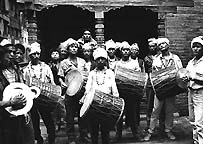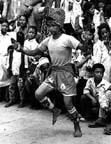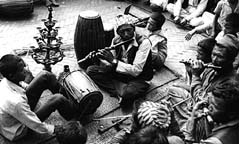 |
The musical traditions of Nepal are as diverse as the various ethnic groups of the country. Arguably the most complex musical culture in the Himalayas is that of the Newar people in the Kathmandu Valley which in the course of the past two thousand years has absorbed mostly Indian influences shaping a unique musical tradition.
The Newar culture flourished during the late Malla dynasty from the 15th century up to the 18th century. The Malla kings of Kathmandu, Patan and Bhaktapur were devoted patrons of the arts and competed with one another in the beautification and cultural achievements of their kingdoms. Many of these Malla kings excelled as musicians, dancers, poets and town planners.
 The Newar live in a Buddhist-Hindu area where the two religions coexist along with a strong influence of Tantric practices and local traditional cults. In the complex Newar caste system both Hindus and Buddhists have found their place. Many of these castes perform their own characteristic musical repertory and ritual duties during festivals and processions. Newar music and dances are always related to ritual and locality. A portion of Newar music is secretly performed during esoteric rites.
The Newar live in a Buddhist-Hindu area where the two religions coexist along with a strong influence of Tantric practices and local traditional cults. In the complex Newar caste system both Hindus and Buddhists have found their place. Many of these castes perform their own characteristic musical repertory and ritual duties during festivals and processions. Newar music and dances are always related to ritual and locality. A portion of Newar music is secretly performed during esoteric rites.
 |
Bhaktapur, a Newar farmers' town at the eastern rim of the Kathmandu Valley has been able so far to preserve much of its traditional heritage. In 1980ies there were still more than two hundred music and dance groups performing regularly. With the influx of tourism and Western and Far Eastern technologies this picture changes rapidly. It is conceivable that these living cultural treasures may vanish within one generation. For the future there needs to be an effective method for the preservation of traditional music and dance.
Dramatic changes can be seen not only among the Newar but also among all ethnic groups of Nepal - even in areas far from the Kathmandu Valley. What Nepalese perceive as 'the loss of our culture' happens at a rapid pace and goes along with the ravaging of the natural environment, an alarming population growth, unbalanced distribution of resources, rampant exploitation and corruption, political instability and a growing desperation and readiness to solve problems not through compromise but with violence. Current change devastates Nepal like a wild river. This must be controlled and channelled into a less destructive course. Preservation of culture and environment is a precondition for sustainable development. In this context, the academic discipline of ethnomusicology could play an important part.
The aim of the K.U. Department of Music is to train competent musicians and ethnomusicologists to document, preserve, and work creatively with the endangered musical traditions of Nepal. As Bhaktapur is considered by many to be the capital of the performing arts, this traditional farmers' town is an ideal laboratory for students of ethnomusicology.
Kathmandu University Department of Music
In August 1996, Kathmandu University (K.U.) opened a Department of Music in Bhaktapur, where ethnomusicology (B.Mus. and M.Mus.) and practical music (North Indian classical and Nepalese local traditions) are taught to Nepalese and foreign students. The then German President, Dr. Roman Herzog, inaugurated the department during his state visit to Nepal on 29th November 1996. The academic courses are conducted by an experienced ethnomusicologist from Germany and lecturers from the U.S. and Nepal. Teaching staff for performance training includes local musicians and dancers. An exchange of academic teachers and students has been agreed upon and carried out between Kathmandu University and the School of Oriental and African Studies (SOAS), University of London. SOAS recognizes the exams passed at the Bhaktapur Department of Music for internal purposes. Presently, the K.U. Department of Music is the only university department in South Asia conducting full-fledged course in ethnomusicology. To date (July 2010), students from twenty-eight different countries have studied at the Bhaktapur department.
The aim of the K.U. Department of Music is to train competent musicians and ethnomusicologists to document, preserve, and work creatively with the endangered musical traditions of Nepal. As Bhaktapur is considered by many to be the capital of the performing arts, this traditional farmers' town is an ideal laboratory for students of ethnomusicology. The department is situated in an idyllic setting at a 19th century temple area (Shivalaya) at the periphery of Bhaktapur. The Shivalaya was built by the great-grandfather of the Dhaubhadel family, in order to acquire religious merit. This temple area has been transformed into the Department of Music with a library, digital sound recording studio, climatized sound archive, permanent exhibition of musical instruments, computer and video room, seminar room, and three class rooms and performance pavilion spread all over the large garden. A canteen provides lunch and tea. Bhaktapur offers a large number of lodges and private accommodation.
Please click here for detailed information on mission, objectives, academic programmes, and admission.
Please click here for detailed information on curriculum, courses, and faculty.
 |
The K.U. Department of Music has been conceived by the German drummer and ethnomusicologist Dr. Gert-Matthias Wegner who has done extensive research in North Indian and Nepalese musical traditions. He has been appointed by Kathmandu University as Associate Professor and Head of Department of Music.
Please click here for C.V. of G.-M. Wegner.
The Kathmandu University Department of Music is an institution dedicated to the preservation and continuation of the rich traditional heritage of Nepalese music. If you wish to contribute to this task, you could for example finance a scholarship for a Nepalese student (3.900 Rs. per month), or a music teacher's salary (approx. 5.000 Rs. per month), or teaching material and equipment
Also guest lecturers (ethnomusicologists) are most welcome.
Contact:
Kathmandu University
P.O.Box 6250
Kathmandu, Nepal
Tel.: 00977-1-4479505, 4488365
e-mail: music.department@ku.edu.np
Masterdrummers of Nepal
The Kathmandu University Department of Music presents concert tours of the famous Masterdrummers of Nepal. This ensemble consists of ten musicians and dancers, including teachers and students at the Department of Music. The group performs two vibrant forms of Newar drumming, a ritual ensemble of nine drums (navabaja) accompanied by shawms, flutes, natural trumpets and cymbals, and an ensemble of processional drumming (dhimay drums and cymbals) and several traditional dances of Bhaktapur.
This ensemble toured Western Europe with great success during 1990 ('International Festival of Traditional Music DHIN DHA TUM TAK'), Italy during 1999 and 2000 ('La notte di San Lorenzo', 'Festival Musicale del Mediterraneo', etc.), and Germany and the Czech Republic ('Festival Mitte Europa') during 2001, Linz Parade 2009, Festival Bombarde, Brittany 2010.
Please click here for additional information on the 'Masterdrummers of Nepal'.